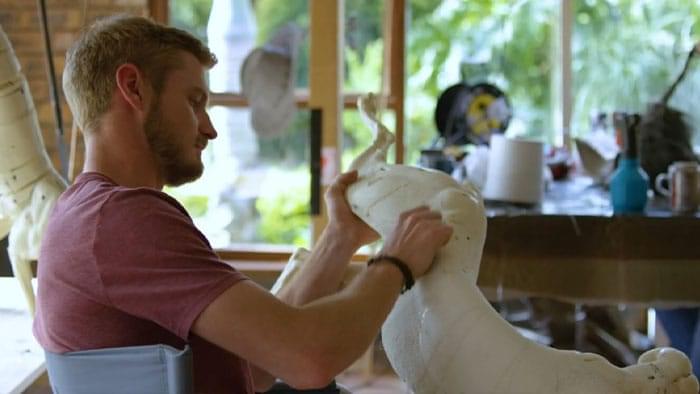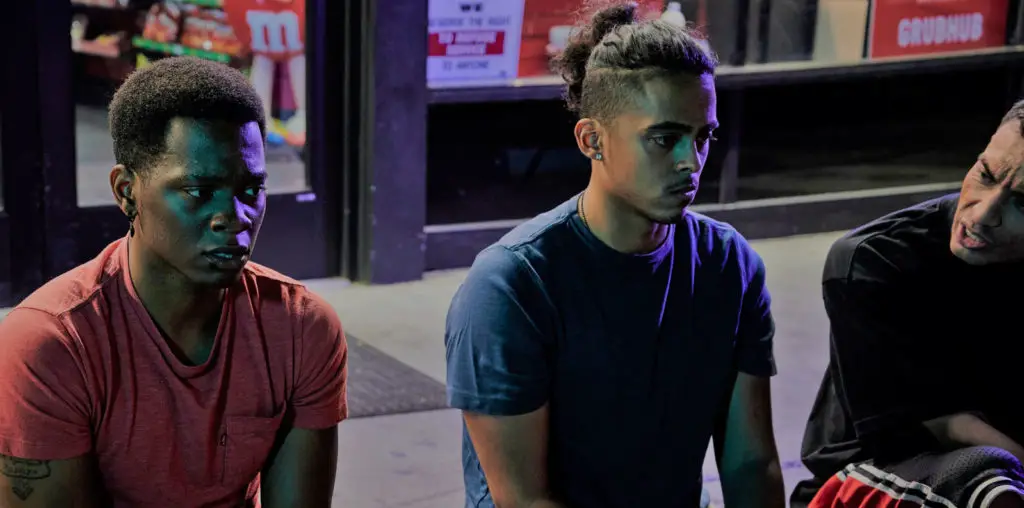
You somehow managed to make a career by accident. What was your big break?
I think the big break was probably in 2004. It was a pretty cool break. We made a movie that had Faye Dunaway, and David Carradine in it called The Last Goodbye. It was just this little indie drama, and that went to Tribeca. That then got me in a position to do The Signal. It premiered at Sundance in 2007. And that was like a turning point, especially at the time because it was this little $50,000 movie out of Atlanta with three directors that became a hit at Sundance and sold for $3 million.
It was big for me because it had three directors. So it launched three separate movie careers instead of just one. So as a composer over the next few years, each of those guys continued to get other opportunities to make movies, and they would call me to score them.
Yeah, I see that one of them was David Bruckner with whom you did The Night House and The Ritual. It all comes full circle. There’s kind of a networking aspect of your work, I would imagine.
It’s all driven by relationships. This whole business seems to be kind of this just strangely random series of events, like in a big pinball machine. All the little mechanisms in the pinball machines are relationships and people you have things in common with. You bounce around inside, and it’s kind of the haphazard nature of this business.
What advice would you give to an emerging composer who wants to get starting in indie films?
I’ve just basically said yes to everything I’ve been offered because you never know. Like with The Signal, I mean it was so little money, like $50,000 for the whole movie.
Get involved in projects because the content inspires you, or it’s an opportunity to work with a particular person. Take these opportunities and don’t worry about assessing the value of the project at the time, because you don’t know where and what that project might become later. You don’t know who you’re going to work with or where they’re going to be down the road. It’s all an opportunity to learn.
I had no business getting into this in the first place and probably still don’t. But I have more projects to work on now than I can possibly do and keep up. I just learned on the job by jumping onboard people’s projects when they would come asking. Somebody said to me a long time ago that they challenged the conventional wisdom of “it’s who you know.” They say that’s not true. It’s backward, “It’s who knows you.” And I think that beyond the semantics of that, I think it’s you got to do your thing and get your thing out there, so people can be aware that you exist. So don’t hoard your ideas. There’s no harm in putting stuff out there, sharing stuff, giving stuff you’ve written to people to use in their movie.

“..get them on board as early in the process as you can and try to identify the kind of sound you would want early…”
Another piece of advice I always tell people is getting to know the other people who you end up working within every phase that you’re going to be involved in. So, in other words, if you’re starting out, meet other editors, who are younger and starting out too. Meet other writers and other people who are going to be involved in the same phase of a film production process that you are because I’ve gotten a lot of opportunities to score films by having shared my music with all the editors that I know. Sometimes my music ends up getting temporarily thrown into a scene when they’re working with the director and cutting a scene. Then somebody comes in, and they watch the scene. They go, “This is great. You know, what music is this? Who’s that guy?” Then our friend tells them, “we might be able to get him on board this thing. I can email him (or her).” I’ve gotten opportunities just from having my stuff temped into early cuts that I never even knew was going on. And then there you go, you’re on the project. Your work and the stuff you put out there can be your best business card.
From the filmmaker’s point of view, what advice do you have for producers and directors to not only find a composer but also work with a composer for the first time or in the early stages?
Yeah, that’s a good question. I’ve worked with a lot of first-time directors. I used to say, as a general rule, try to surround yourself with people who have done it more times than you so they can help you through the process. The director has to make so many decisions about their movie and has to make them at lightning speed, even all the way through post-production.
But specifically with the composer, I would say get them on board as early in the process as you can and try to identify the kind of sound you would want early on. Also, find the person that you would enjoy working with, who you trust and feel vulnerable enough or confident enough to be vulnerable with your movie. You’re going to need to strip it down naked and just look at it for what it is and figure out where you need help. Music is one of your most effective and potent storytelling assets. If you bring on the composer too late, then you’re kind of cheating yourself as the filmmaker out of the opportunity to maximize the potency of that asset. So the earlier you get them on, the more prospects they may have to give you options and go through different rounds of ideas so that you can have a chance to experiment with you finding your movie.
Do you have an interesting story about dealing with conflict, not that you hated the person, but where there was an idea that you were on the polar opposite sides and how you work through it?
With the filmmaker, yeah, I think I’ve been pretty fortunate. There are battles on every project. If you’re an opinionated, strong-willed, creative type, you’re going to end up ultimately locking horns from time-to-time over certain things. But you can handle those without it actually getting heated or complicated. There are people I’ve worked with who I think come back to me because of my tendency not necessarily to agree all the time but at least, challenge the idea.
When I come in on a project, I come in as a storyteller. I’m not there to throw a coat of paint on the walls in the background. I’m there to be an additive ingredient to communicate this story. More importantly, I’m an extension of the director’s vision, and I’m there to serve that. And so typically if I clashed with anybody, it’s usually producers, more than directors. They have a different plan, generally speaking, because they have other masters they serve, whereas my main concern is helping the director.

